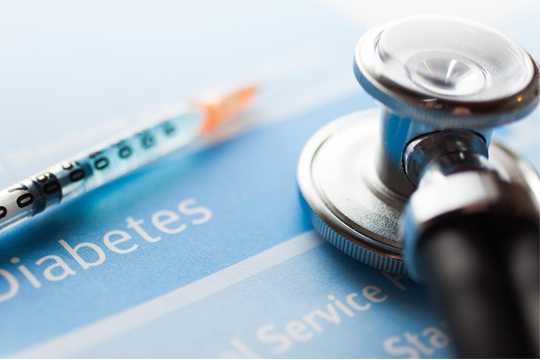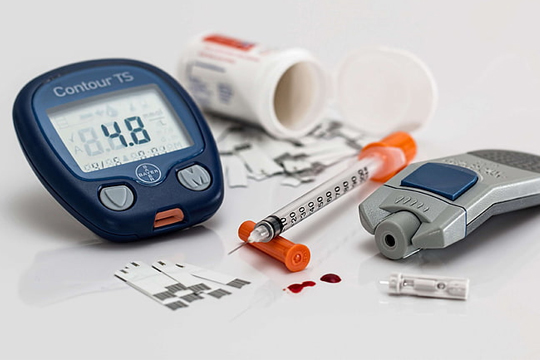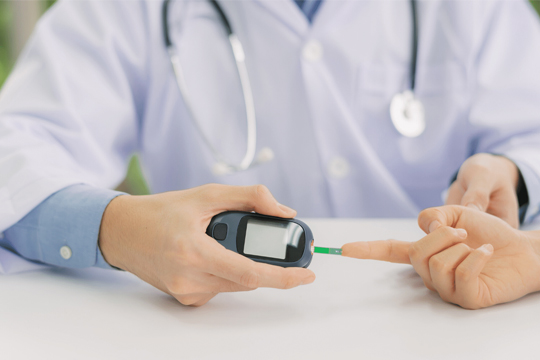
The department of Diabetology aims to provide the best possible patient care by incorporating the latest therapeutic advances for the prevention and management of Diabetes.
Diabetes is a metabolic disorder wherein the human body stops producing or fails to properly utilise insulin, a hormone that is required to convert sugar, starches, and other food into energy. Diabetes Mellitus is characterized by constant high levels of blood glucose (sugar).The effects of diabetes mellitus include long-term damage, dysfunction and failure of various organs. Diabetes can lead to serious complications and premature death, but appropriate evaluation, guidance and precaution taken in time can be of immense help to control the disease and lower the risk of complications.
In this area of clinical science, our services include diagnosis, treatment and follow-up. Apart from regulating medication (e.g. insulin) dosage and timing, we are equipped with excellent facility to deal with the potential consequences of diabetes, e.g. retinopathy, nephropathy and peripheral neuropathy, strokes & heart attack and many other associated diseases.Complications of Diabetes are dealt within the hospital in association with the Endocrinologist and associated specialities. Examples include : diabetic renal disease, diabetic eye disease, management of obesity, diabetic neuropathy (diabetes affecting the nerves), ischaemic heart disease & stroke.
A loved one deserves exceptional care
Call 0181 245 5411 so we can discuss your needs



Gestational Diabetes (Diabetes diagnosed during pregnancy) is on the rise. Hence, our Endocrinologists in consultation with our Obstetricians and Dietary Specialists attend to these patients with the aim of providing a positive outcome for mother and child.
The Department consists of a team of committed Specialists working relentlessly to provide the best possible evidence based guidance to address conditions such as :-
Glucose Assessment & Control:- Many foods break down into blood sugar, which is used for energy to fuel our brain, heart and muscles. Blood sugar either comes from the food we eat or is made by the liver, and is found in the blood stream (as it is carried to all of our organs and cells) and inside the cells (where it is changed into energy).
Assessment of Complications and Associated Conditions:- This study aims to develop a patient-based measure of the complications of type 2 diabetes that can be used in examining its relationship with health-related quality of life (HRQOL) and utilization of health services.
Childhood Diabetes:- Type 2 diabetes in children is a chronic disease that affects the way your child’s body processes sugar (glucose) for fuel. Without treatment, the disorder causes sugar to build up in the bloodstream, which can lead to serious long-term consequences.
Diabetes (Type 1 & Type 2):- There are two main types of diabetes: type 1 and type 2.Both types of diabetes are chronic diseases that affect the way your body regulates blood sugar, or glucose. Glucose is the fuel that feeds your body’s cells, but to enter your cells it needs a key. Insulin is that key.
Gestational Diabetes:- Gestational diabetes is diabetes diagnosed for the first time during pregnancy (gestation). Like other types of diabetes, gestational diabetes affects how your cells use sugar (glucose). Gestational diabetes causes high blood sugar that can affect your pregnancy and your baby’s health.
Obesity in Diabetes:- Obesity is the leading risk factor for type 2 diabetes. The Centers for Disease Control and Prevention report that 32% of white and 53% of black women are obese. Women with a body mass index (BMI) of 30 kg/m2 have a 28 times greater risk of developing diabetes than do women of normal weight.
Weight reduction in Diabetes:- One study found that people with type 2 diabetes improved their blood sugar control when they lost as little as 2% of their body weight. And research shows that losing 5% of your extra weight will make you less likely to get heart disease by improving blood pressure, blood sugar, and HDL cholesterol (the good kind).
Diabetic Nephropathy:- Diabetic nephropathy is a common complication of type 1 and type 2 diabetes. Over time, poorly controlled diabetes can cause damage to blood vessel clusters in your kidneys that filter waste from your blood. This can lead to kidney damage and cause high blood pressure
Diabetic Neuropathy:- Diabetic neuropathy is a type of nerve damage that can occur if you have diabetes. High blood sugar (glucose) can injure nerves throughout the body. Diabetic neuropathy most often damages nerves in the legs and feet. Depending on the affected nerves, diabetic neuropathy symptoms include pain and numbness in the legs, feet and hands. It can also cause problems with the digestive system, urinary tract, blood vessels and heart.
Diabetes with Hypertension:-High blood pressure (hypertension) can lead to many complications of diabetes, including diabetic eye disease and kidney disease, or make them worse. Most people with diabetes will eventually have high blood pressure, along with other heart and circulation problems. Diabetes damages arteries and makes them targets for hardening, called atherosclerosis. That can cause high blood pressure, which if not treated, can lead to trouble including blood vessel damage, heart attack, and kidney failure.
Diabetic Foot:- They can happen over time when high blood sugar damages the nerves and blood vessels in the feet. The nerve damage, called diabetic neuropathy, can cause numbness, tingling, pain, or a loss of feeling in your feet. If you can’t feel pain, you may not know when you have a cut, blister, or ulcer (open sore) on your foot
Diabetic Retinopathy:- Diabetic retinopathy (die-uh-BET-ik ret-ih-NOP-uh-thee) is a diabetes complication that affects eyes. It’s caused by damage to the blood vessels of the light-sensitive tissue at the back of the eye (retina). At first, diabetic retinopathy might cause no symptoms or only mild vision problems.
Dietary Guidance (Patient Education & Counselling Services):- Dietary counseling provides individualized nutritional care for encouraging the modification of eating habits. It may also assist in the prevention or treatment of nutrition-related illnesses such as cardiovascular disease, cancer, obesity, diabetes, and hyperlipidemia.
Life style advice:- At this extreme moment, we began working from home, away from campus, and keeping social distance for as many
people as possible. As we stay home and are stuck with the foods that have been in our fridge or pantry for a while, we are temporarily living a sedentary lifestyle with increased odds of physical inactivity, excessive eating and sitting, stress, anxiety, and depression. In particular, many of us will gain some weight during the pandemic and may keep the extra weight permanently, which may carry considerable health risks for type 2 diabetes, hypertension, heart attack, stroke, and other health problems.
Experience Exceptional Healthcare at Sarvodya Hospital
Patient Testimonials
We got the best service from the Sarvodya Hospital. And one of the best doctor experience I found. Difficult task with easiest way. Good communication with patients. Helpful staffs. Thanks To Sarvodya Hospital.
lt was more of follow up to meet the doctor after surgery. for my mother..treatment and surgery went well previously… took good care of her.
I am very much grateful to Sarvodhya Hospital. I advise all the patients who are suffering from urological problems to visit Sarvodhya Hospital and get rid of the problems permanently.

